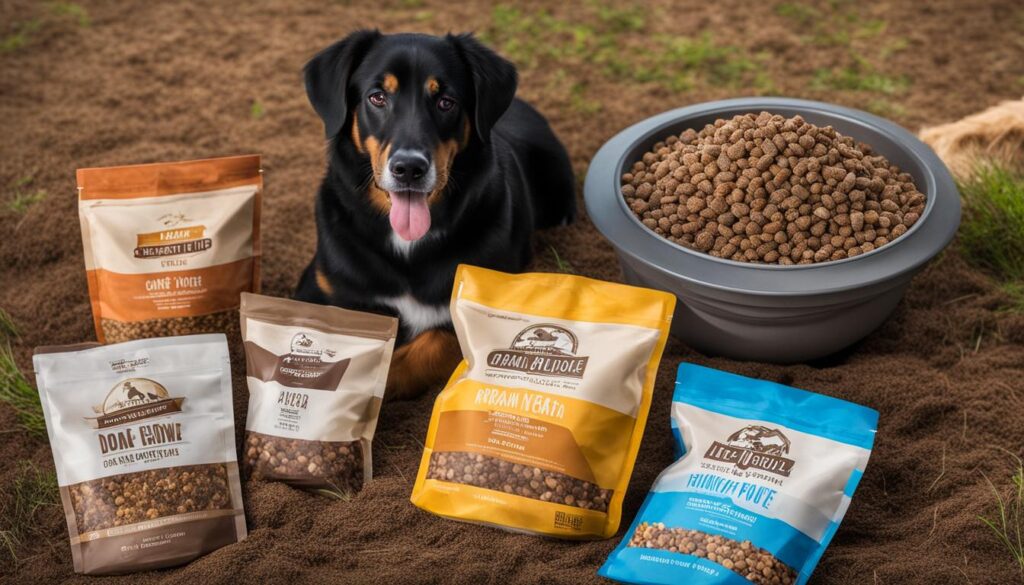As a responsible pet owner, it is important to understand why your puppy may be experiencing diarrhea. Diarrhea in puppies can be a worrisome and messy issue, but with the right knowledge, you can address the problem effectively. In this comprehensive guide, we will explore the common causes of puppy diarrhea, how to treat it, and steps you can take to prevent it from happening in the first place.
Key Takeaways:
- Diarrhea in puppies can have various causes, including dietary indiscretion, change in diet, food intolerance, allergies, parasites, infections, antibiotics, and stress.
- Understanding your dog’s unique digestive system can help you identify and manage diarrhea effectively.
- Monitoring your puppy’s poop can provide insights into their overall health.
- Mild cases of puppy diarrhea can often be treated at home with over-the-counter remedies and a bland diet.
- If diarrhea persists or is accompanied by concerning symptoms, it is important to consult a veterinarian for proper diagnosis and treatment.
How a Dog’s Digestive System Works
Dogs have a remarkable digestive system that is well-suited to their dietary needs. Understanding how dogs digest food can help you better care for your furry friend’s digestive health.
When it comes to eating, dogs have a unique set of tools. Their jaws and salivary enzymes are designed for tearing and crushing food efficiently. Unlike humans, dogs have a highly acidic stomach environment, which aids in the breakdown of proteins and kills potential pathogens.
Their digestive process differs from ours in terms of speed as well. Food moves rapidly through their digestive system, with most digestion occurring in the stomach. A dog’s digestive transit time is generally under 10 hours, resulting in well-formed and firm stools.
To visualize the dog’s digestive system, here is a breakdown:
| Organ | Function |
|---|---|
| Mouth | Food is chewed and mixed with saliva. |
| Esophagus | Food travels down to the stomach through peristaltic contractions. |
| Stomach | Food is mixed with gastric acids and broken down into a semi-liquid mass called chyme. |
| Small Intestine | Nutrient absorption takes place. |
| Large Intestine | Water is absorbed, and the remaining waste turns into feces. |
| Rectum | Feces are stored before defecation. |
How a Dog’s Digestive System Works
The unique design of a dog’s digestive system allows them to efficiently process the food they consume. Their strong stomach acids and rapid digestion help ensure the absorption of vital nutrients and the elimination of waste products.
Understanding the intricacies of your dog’s digestive system can help you make informed decisions about their diet and monitor their overall health. Proper nutrition and regular veterinary care are crucial for maintaining a healthy digestive system and promoting your dog’s well-being.
Top Causes of Dog Diarrhea
Diarrhea in dogs can be caused by various factors, and identifying the underlying cause is essential for effective treatment. Here are some common causes of dog diarrhea:
- Dietary Indiscretion: Dogs can develop diarrhea from eating too much food or garbage.
- Diet Change: A sudden change in diet can upset a dog’s stomach and lead to diarrhea.
- Food Intolerance: Dogs may have sensitivities or allergies to certain ingredients in their food, causing digestive upset.
- Parasites: Roundworms, hookworms, and giardia are common parasites that can cause diarrhea in dogs.
- Swallowing Foreign Objects: Ingesting objects like toys, socks, or bones can lead to intestinal blockage and diarrhea.
- Infections: Bacterial and viral infections can cause diarrhea in dogs.
- Illnesses: Kidney and liver disease, colitis, inflammatory bowel disease, and cancer can all contribute to diarrhea in dogs.
- Antibiotics: Some antibiotics can disrupt the balance of bacteria in the gut and result in diarrhea.
- Stress: Dogs can experience diarrhea as a response to stress or anxiety.
It is important to note that these are just a few of the possible causes of dog diarrhea. Identifying the specific cause is crucial for implementing the appropriate treatment plan.
Seeking veterinary advice and guidance is recommended for accurate diagnosis and effective management of dog diarrhea.
What Poop Says About Your Dog’s Health
The consistency, color, and other characteristics of your dog’s poop can provide important insights into their overall health. Monitoring their poop can help you detect potential health issues early on and take appropriate action. Here’s what you need to know about what your dog’s poop says about their health:
Poop Color
The color of your dog’s poop can indicate various health conditions. Normal poop should be chocolate brown in color, indicating a healthy digestion process. However, if you notice any abnormal colors like orange, green, gray, or black, it could be a sign of underlying health issues that require attention. For example, black or tarry poop may indicate bleeding in the upper digestive tract, while green or yellow poop could indicate issues with the liver or gallbladder.
Poop Consistency
The consistency of your dog’s poop is another important factor to consider. Normal poop should be well-formed and log-shaped. If you notice that your dog’s poop is too soft, watery, or pudding-like, it could be a sign of diarrhea or other digestive issues. Conversely, if the poop is too hard or dry, it could indicate constipation. Monitoring the consistency of your dog’s poop can help you identify potential digestive problems early on.
Other Characteristics
Aside from color and consistency, there are other characteristics of your dog’s poop that you should pay attention to. Presence of mucus or blood in the stool could indicate inflammation or infection in the digestive tract. Excessive volume or frequency of poop could be a sign of an underlying issue like food intolerance or malabsorption. By observing these characteristics, you can provide valuable information to your veterinarian and help them make an accurate diagnosis.
Remember, changes in your dog’s poop can be an indication of underlying health problems, and it is important to monitor their poop regularly. If you notice any persistent abnormalities or if your dog’s poop is accompanied by other concerning symptoms, it is recommended to consult with a veterinarian for proper diagnosis and treatment.
| Poop Color | Possible Causes |
|---|---|
| Chocolate Brown | Healthy digestion |
| Orange | Liver or gallbladder issues |
| Green | Issues with digestion or bile production |
| Gray | Pancreatic problems |
| Black or Tarry | Bleeding in upper digestive tract |

“The consistency, color, and other characteristics of your dog’s poop can provide important insights into their overall health.”
Home Remedies for Dog Diarrhea
Treating Mild Cases at Home
If your dog is experiencing mild diarrhea, there are several home remedies you can try to help alleviate their discomfort. One option is to provide over-the-counter dog diarrhea treatments, which can help firm up your dog’s stool and reduce the frequency of bowel movements. These treatments typically contain ingredients such as kaolin and pectin, which help to absorb excess water in the intestines.
Another home remedy is fasting your dog for 12 to 24 hours. This allows their digestive system to rest and recover. During this time, make sure to provide small amounts of fresh water to prevent dehydration. After the fasting period, you can gradually reintroduce simple, easily digestible foods such as boiled white rice, pumpkin, and plain yogurt with active cultures.
Using Natural Supplements
In addition to over-the-counter treatments, there are also natural supplements that can help reduce dog diarrhea. Probiotics, which contain beneficial bacteria, can help restore the balance of gut flora and improve digestion. Look for probiotics specifically formulated for dogs and follow the recommended dosage instructions.
Gut-soothing herbs such as chamomile, ginger, and peppermint can also provide relief from diarrhea. These herbs have anti-inflammatory properties and can help soothe the digestive system. You can find these herbs in supplement form or as teas, but make sure to consult with your veterinarian before giving them to your dog.
Special Diets for Sensitive Stomachs
If your dog has a sensitive stomach, you may want to consider feeding them specially-formulated dog food designed for digestive health. These foods are typically made with easily digestible ingredients and may contain added prebiotics and fiber to promote healthy digestion. Look for brands that are labeled as being suitable for dogs with sensitive stomachs or gastrointestinal issues.
While home remedies can be effective for mild cases of dog diarrhea, it’s important to consult with a veterinarian if your dog’s symptoms worsen or persist. A veterinarian can help determine the underlying cause of the diarrhea and provide appropriate treatment. They can also offer guidance on preventing future episodes of diarrhea in your dog.
| Home Remedies for Dog Diarrhea | Recommended Dosage |
|---|---|
| Over-the-counter dog diarrhea treatments | Follow package instructions |
| Fasting | Withhold food for 12 to 24 hours, provide small amounts of fresh water |
| Boiled white rice | Start with a small portion and gradually increase |
| Pumpkin | Start with a teaspoon and gradually increase |
| Plain yogurt with active cultures | Start with a small amount and gradually increase |
| Probiotics | Follow package instructions or consult with a veterinarian |
| Gut-soothing herbs (chamomile, ginger, peppermint) | Follow package instructions or consult with a veterinarian |
| Specially-formulated dog food for sensitive stomachs | Follow package instructions or consult with a veterinarian |
What Causes Diarrhea in Puppies?
Puppies are more vulnerable to diarrhea due to their delicate immune systems and their curious nature, which leads them to explore and taste everything in their environment. Several factors can contribute to diarrhea in puppies, including:
- Diet change: Abruptly switching your puppy’s diet or introducing new foods can disrupt their digestive system and result in diarrhea.
- Bacterial and viral infections: Puppies are more susceptible to infections, which can lead to gastrointestinal upset and diarrhea.
- Parasites: Worms and other parasites can cause diarrhea in puppies. Common parasites include roundworms, hookworms, and giardia.
- Stress: Puppies can experience stress from changes in their environment, being separated from their mother and littermates, or other factors. This stress can manifest in diarrhea.
If your puppy is experiencing diarrhea, it is important to monitor their condition and contact a veterinarian if the diarrhea is severe, persistent, or accompanied by other concerning symptoms. A veterinarian will be able to determine the underlying cause of the diarrhea and recommend appropriate treatment.
“Puppies are more vulnerable to diarrhea due to their delicate immune systems and their curious nature.”
Preventive measures such as gradual diet changes, regular deworming, and minimizing stress can help reduce the occurrence of diarrhea in puppies. Additionally, maintaining a clean environment, providing proper vaccinations, and practicing good hygiene can also contribute to a healthy digestive system in puppies.
By understanding the common causes of diarrhea in puppies and taking appropriate preventive measures, you can help ensure the health and well-being of your furry friend.
| Causes of Diarrhea in Puppies |
|---|
| Diet change |
| Bacterial and viral infections |
| Parasites |
| Stress |
When to Call the Vet for Puppy Diarrhea
Diarrhea in puppies can be a cause for concern, but determining when to call the vet can be tricky. It’s always better to be safe than sorry when it comes to your puppy’s health. Here are some signs to watch for that indicate it may be time to seek veterinary attention:
- Severe diarrhea: If your puppy is experiencing frequent and severe bouts of diarrhea, it may be a sign of a more serious underlying issue.
- Persistent diarrhea: If the diarrhea continues for more than a day or two with no signs of improvement, it’s a good idea to consult a vet.
- Blood or mucus in the stool: The presence of blood or mucus in your puppy’s diarrhea can indicate an infection or other medical condition that requires immediate attention.
- Other symptoms: If your puppy is also experiencing vomiting, lethargy, loss of appetite, or other concerning symptoms along with diarrhea, it’s important to seek veterinary advice.
- Age and health conditions: Young puppies and puppies with pre-existing health conditions may be more susceptible to complications from diarrhea, so it’s best to consult a vet if they are experiencing diarrhea.
Remember, every puppy is different, and what may be cause for concern in one puppy may not be in another. If you’re unsure whether to call the vet, it’s always best to err on the side of caution and seek professional advice. Your vet will be able to assess your puppy’s individual situation and provide appropriate guidance and treatment.
Table: Signs to Watch for in Puppy Diarrhea
| Signs | When to Call the Vet |
|---|---|
| Severe diarrhea | If diarrhea is frequent and severe |
| Persistent diarrhea | If diarrhea continues for more than a day or two with no improvement |
| Blood or mucus in the stool | If diarrhea is accompanied by blood or mucus |
| Other concerning symptoms | If your puppy is also experiencing vomiting, lethargy, loss of appetite, or other concerning symptoms along with diarrhea |
| Age and health conditions | If your puppy is very young or has pre-existing health conditions |
By closely monitoring your puppy’s symptoms and knowing when to call the vet, you can ensure prompt and appropriate care for your furry friend.
Treating Diarrhea in Puppies
If your puppy is experiencing diarrhea, it’s important to take appropriate measures to treat the condition. The treatment for puppy diarrhea depends on the underlying cause. In mild cases caused by stress or dietary changes, you can manage the condition at home by providing a bland diet and ensuring your puppy has plenty of water. However, if the diarrhea is severe, caused by a bacterial or viral infection, or if your puppy is not eating or drinking, it may be necessary to seek veterinary attention.
When you consult a veterinarian, they may prescribe antibiotics, intravenous fluids, or specific medications based on their diagnosis. Hospitalization may be required in certain cases to closely monitor your puppy’s condition and provide the necessary medical care. It’s important to follow the guidance of your veterinarian to ensure proper treatment and support your puppy’s recovery.
Remember, each case of puppy diarrhea is unique, and treatment will vary depending on the specific circumstances. Consulting with a veterinarian is crucial to accurately diagnose the underlying cause and determine the most effective course of action. They will provide personalized advice and guidance to help your puppy overcome the diarrhea and restore their digestive health.
Common Treatment Options for Puppy Diarrhea
| Treatment Option | Description |
|---|---|
| Bland Diet | A diet consisting of easily digestible foods like boiled white rice and boiled chicken can help soothe your puppy’s upset stomach and firm up their stool. |
| Medications | Your veterinarian may prescribe medications such as anti-diarrheal drugs, antibiotics, or probiotics to address the underlying cause of the diarrhea and promote healing. |
| Intravenous Fluids | If your puppy is dehydrated or unable to consume fluids orally, intravenous fluids may be administered to restore hydration and provide essential nutrients. |
| Hospitalization | In severe cases or when the underlying cause is particularly serious, hospitalization may be necessary to closely monitor your puppy and provide intensive care. |
It’s crucial to closely follow your veterinarian’s recommendations and administer any prescribed medications as directed. Additionally, providing a calm and stress-free environment for your puppy during the treatment process can contribute to their overall well-being and recovery.
Preventing Diarrhea in Puppies
Preventing diarrhea in puppies is crucial for their overall health and well-being. By taking a few simple steps, you can minimize the chances of your puppy experiencing this unpleasant condition. Here are some tips to help you keep your furry friend’s tummy happy and healthy:
- Transition their diet slowly: When introducing a new food to your puppy’s diet, it is important to do it gradually. This allows their digestive system to adjust and reduces the risk of developing diarrhea. Start by mixing a small amount of the new food with their current food and gradually increase the proportion over several days.
- Maintain a clean environment: Keep your puppy’s living space clean and free from potential sources of contamination. Regularly clean their food and water bowls, bedding, and toys to prevent the growth and spread of bacteria or parasites.
- Follow recommended vaccination protocols: Vaccinations are essential in preventing certain diseases that can lead to diarrhea in puppies. Consult with your veterinarian to ensure your puppy’s vaccinations are up to date and follow the recommended schedule.
- Prevent ingestion of harmful substances: Puppies are naturally curious and may try to eat things they shouldn’t. Keep household cleaners, toxic plants, medications, and other potentially harmful substances out of reach to prevent accidental ingestion.
- Regular parasite prevention: Parasites such as worms can cause diarrhea in puppies. Follow a regular deworming schedule recommended by your veterinarian to keep your puppy protected. Flea and tick prevention are also essential, as these parasites can transmit diseases that can lead to diarrhea.
By implementing these preventive measures, you can significantly reduce the risk of your puppy experiencing diarrhea. However, it’s important to remember that some cases of diarrhea may still occur despite your best efforts. If your puppy does develop diarrhea, consult with your veterinarian for appropriate treatment and guidance.
Table: Tips for Preventing Puppy Diarrhea
| Tips | Description |
|---|---|
| Transition their diet slowly | Introduce new food gradually to prevent digestive upset. |
| Maintain a clean environment | Regularly clean your puppy’s living space to prevent contamination. |
| Follow recommended vaccination protocols | Ensure your puppy is up to date on vaccinations to prevent diseases that can cause diarrhea. |
| Prevent ingestion of harmful substances | Keep toxic substances out of reach and prevent accidental ingestion. |
| Regular parasite prevention | Follow a deworming schedule and use flea and tick prevention to protect against parasites. |

Conclusion
To summarize, puppy diarrhea is a common issue that can have various causes, including dietary indiscretion, food intolerance, parasites, infections, and stress. It is important to monitor the color, consistency, and other factors of your puppy’s diarrhea to determine its cause and seek appropriate treatment.
While mild cases of puppy diarrhea can often be managed at home with home remedies and a bland diet, severe or persistent diarrhea requires veterinary attention. By identifying the underlying cause and providing proper treatment, you can help maintain your puppy’s health and well-being.
Prevention is also key in reducing the likelihood of puppy diarrhea. Gradually transitioning your puppy to a new diet, keeping their environment clean, providing recommended vaccinations, and regular parasite prevention are some preventive measures you can take.
Remember, consulting with a veterinarian is crucial for personalized advice and guidance when it comes to your puppy’s diarrhea. They can provide the best course of action based on your puppy’s specific needs. With the right care and attention, you can ensure that your puppy stays healthy and happy.
FAQ
What are the common causes of puppy diarrhea?
Common causes of puppy diarrhea include dietary indiscretion, change in diet, food intolerance, allergies, parasites, swallowing foreign objects, infections, illnesses, antibiotics, and stress.
What should normal dog poop look like?
Normal dog poop should be chocolate brown, shaped like a log, and easy to scoop.
How can I treat mild cases of dog diarrhea at home?
Mild cases of dog diarrhea can often be treated at home by fasting your dog for 12 to 24 hours, providing small amounts of fresh water, and gradually introducing simple foods like boiled white rice, pumpkin, plain yogurt with active cultures, and gut-soothing herbs.
Why do puppies get diarrhea?
Puppies can experience diarrhea for various reasons, including diet changes or food intolerance, bacterial or viral infections, ingestion of garbage or toxins, parasites, and stress.
When should I call the vet for puppy diarrhea?
Veterinary consultation is recommended if the diarrhea is severe, frequent, persistent for more than a day, accompanied by other symptoms like blood or mucus, or if your puppy is very young or has other health conditions.
How should diarrhea in puppies be treated?
The treatment for puppy diarrhea depends on the underlying cause. Mild cases caused by stress or dietary changes can often be managed at home with a bland diet and plenty of water. However, severe cases may require hospitalization and veterinary treatment with antibiotics, intravenous fluids, and specific medications.
How can I prevent diarrhea in puppies?
While not all cases of puppy diarrhea can be prevented, steps like gradually transitioning your puppy to a new diet, keeping their environment clean, ensuring they receive recommended vaccinations, preventing ingestion of harmful substances, and regular parasite prevention can help reduce the likelihood of diarrhea.




